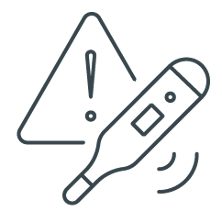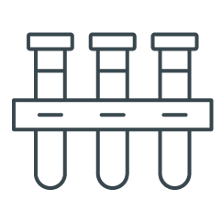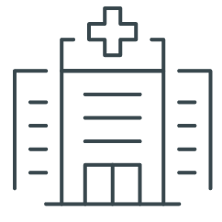COVID-19 Tracking and Response
- Daily Symptom Tracking
- Testing
- Care for Students Who Develop COVID-19 Symptoms
- Contact Tracing FAQ's
- Testing Positive for COVID-19
- Dashboard and Reported Cases


All students, faculty, priests, employees, and visitors to campus must monitor their health daily for COVID-19 related symptoms. All members of the University community are expected to consider their health responsibly.
The symptoms that will be tracked and recorded by users are those recommended by the Centers for Disease Control and are:
- Temperature of 100.3 or higher
- NEW cough
- Shortness of breath
- NEW loss of taste or smell
- Sore throat, congestion, or runny nose (excluding seasonal allergies)
- NEW unexplained fatigue
- Muscle or body ache
- NEW headache
- Nausea or vomiting
- Diarrhea
- Been exposed to someone diagnosed with COVID-19


Testing is an important tool in controlling the spread of the COVID-19 virus. The University provides different types of testing for different types of situations in accordance with guidance from the CDC and NJ state Department of Health.
- Students who have COVID-19 symptoms will receive a rapid Antigen or PCR test.
- Students who have been exposed to someone who tested positive for COVID-19 will be tested 3-5 days after exposure with a PCR test. It is important to note that the test must be a minimum of 3 days after exposure for the testing to be as accurate as possible.
- Students who are asymptomatic but concerned for possible exposure due to risky behavior (i.e., having been in a crowded environment without a mask) will be tested 3-5 days after exposure with a PCR test. Students should quarantine and avoid close contact with others until testing negative and completing a minimum of 10 days of quarantine. Those testing positive will receive further instructions on isolation protocols. It is important to note that the test must be 3-5 days after exposure for the testing to be as accurate as possible, and the testing must be combined with quarantine to avoid the potential of spreading COVID-19 to others.
- Students who are travelling home will be tested 3 days prior to departure with a PCR test. It is important to note that the test must be 3 days prior to departure to ensure that the test results are received prior to departure.
- Students who require a test for their participation in a clinical assignment will be tested through a self-administered saliva sample test. Results are normally received within 3-4 days; therefore, students should plan ahead and schedule their test accordingly.
- Students who are asymptomatic and have had no possible exposure but would like to check their status may be tested as frequently as once per week through our Surveillance Testing program by requesting a Surveillance Test which is self-administered saliva sample test. Results are normally received within 3-4 days.


South Orange Campus:
A student who develops COVID-19 symptoms or has been in close contact with another
person diagnosed with COVID-19 should call Health Services (973-761-9175).
- Students will be advised to schedule a telehealth or in-person appointment.
- Students will be screened for respiratory symptoms and temperature before entering Health Services.
- Students will be assessed if they need to quarantine, be tested for COVID-19, and/or be referred for a higher level of care.
- The waiting area at Health Services will be configured to allow physical distancing and be limited to well patient visits for no more than 10-minute wait times.
- An exam room has been designated for care of patients requiring COVID-19 testing and treatment.
- A triage system for students requiring self-isolation or quarantine has been established. Resident students who can return home (within a day’s drive/300 miles) will be advised to quarantine at home. Resident students who cannot return home will self-isolate/quarantine at a residence area designated by the University (Neumann Hall).
- Students requiring a higher level of medical care will be referred to St. Barnabas Hospital in Livingston, NJ.
After hours and on weekends:
Students have the following resources available when Health Services is not open:
- Local Urgent Care Centers
- Personal health care provider
Full details available on the Health Services website.
Seton Hall Law School:
Students at Seton Hall Law School who develop COVID-19 symptoms or have been in close
contact with another person diagnosed with COVID-19 are eligible for care in Health
Services on the South Orange campus. Students may schedule a telehealth visit or
in-office visit if appropriate (973-761-9175). If this is not convenient or preferable,
Seton Hall Law students should consult the following resources:
- United Health Care Physician Hotline – 877-643-5130
(No cost for those insured with United Health, $25 for everyone else) - Local Urgent Care Centers
- Personal health care provider
Interprofessional Health Sciences Campus:
Students at the IHS who develop COVID-19 symptoms or have been in close contact with
another person diagnosed with COVID-19 are eligible for care in Health Services on
the South Orange campus. Students may schedule a telehealth visit or in-office visit
if appropriate (973-761-9175). If this is not convenient or preferable, students should
consult the following resources:
- United Health Care Physician Hotline – 877-643-5130
(No cost for those insured with United Health, $25 for everyone else) - Local Urgent Care Centers
- Personal health care provider
Contact Tracing FAQs
What is Contact Tracing?
Contact Tracing is the process used to identify individuals who have come in contact
with someone who has been diagnosed with any contagious disease, in this case COVID-19.
Why is Contact Tracing Important?
It is one the most effective ways that we have to contain the spread of COVID-19.
It allows us to reach people to whom the virus may have been transmitted, test them
and prevent them from transmitting the virus to others, days before they may even
begin showing symptoms.
How does Contact Tracing work?
If you are diagnosed with COVID-19 the lab that processes the test is required by
law to inform the Health Department where you live that you have tested positive.
The local Health Department will contact you to determine close contacts.
What if I'm Concerned about Getting in Trouble or Getting Others in Trouble?
Everything is confidential! No one can get in trouble by talking to the Health Department
or Health Services. You can – and should – share everything. It doesn't matter if
you were at a party, if someone was drinking underage, etc. – this is about your and
their health – no one is going to be reported for any violations.
Will My Friends Know I Gave Their Name?
No – everything is confidential. They will be contacted and given education and information
to understand their risk, as well as next steps they may need to take.
Do I Need to Participate in Contact Tracing?
Yes – it's part of all our responsibility in caring for each other and our community. It's
what we do at Seton Hall.
